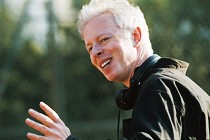CANNES 2009 Competition / France
Magician Resnais’ Wild Grass
"N’importe, nous nous serons bien aimés" (“No matter, we shall have loved each other well”): this quotation from Gustave Flaubert, placed at the heart of Alain Resnais’ latest feature, Wild Grass [+see also:
trailer
film profile], unveiled before the press yesterday evening in competition at the 62nd Cannes Film Festival, alone sums up the veritable feast of funny, brilliant and subtle variations explored by the 86-year-old veteran French director on the theme of a thwarted romantic encounter. However, this truly delightful cinematic magic disappears during the ending, like a faded spell.
Adapted by Alex Réval and Laurent Herbiet from Christian Gailly’s novel L’incident, Wild Grass centres around the theft of a bag, that of Marguerite Muir (the ever-outstanding Sabine Azéma) and the discovery of her wallet by Georges Palet (a brilliant André Dussollier). The latter, a kind but odd man, spurred on by the element of mystery and the prospect of a love affair, initially pesters the woman (a single dentist and amateur pilot) to arrange a meeting (via telephone calls, letters, inspections of the area around her house), before the roles are reversed.
Around these little love games, Resnais weaves a delicate cinematic web, accompanied by a voice-off (Edouard Baer) and dialogues containing lively humour. Added to this is a stunning visual style that plays on the brightness of the vivid colours of the setting and accessories (yellow, blue, red), imaginative editing (including superimpositions on the image) and camera movements that gently encircle their subject.
This visual approach, which owes a lot to the renowned talent of DoP Eric Gautier, leaves the actors free to happily frolic about (with a special tribute to the performance by Mathieu Amalric as an extremely tense policeman and Anne Consigny as a more-than-tolerant wife, not to mention Emmanuelle Devos as a fellow dentist friend) in a world of quasi-burlesque comedy, where the protagonists constantly give in to their impulsive urges.
Moving from one idea to another at the speed of lightning, never finishing what they’ve begun, imagining scenarios before following others, Georges and Marguerite dance a syncopated “waltz of hesitation” around love and chance.
They meet for the first time in front of a cinema showing The Bridges at Toko-Ri (1954) and, as the narrator points out: "when you come out of the cinema, nothing surprises you." Nothing, perhaps, except for the joyful and virtuoso flair (despite the film’s disappointing ending) of a Resnais who had been absent from the Cannes competition for 29 years, ever since his Grand Jury Prize for My American Uncle.
(Translated from French)
Did you enjoy reading this article? Please subscribe to our newsletter to receive more stories like this directly in your inbox.



















